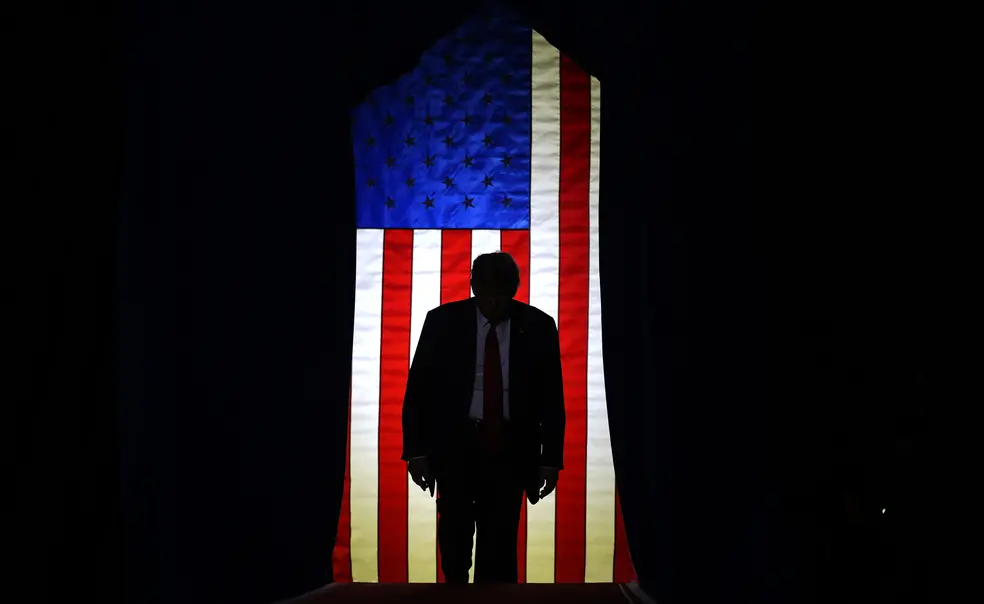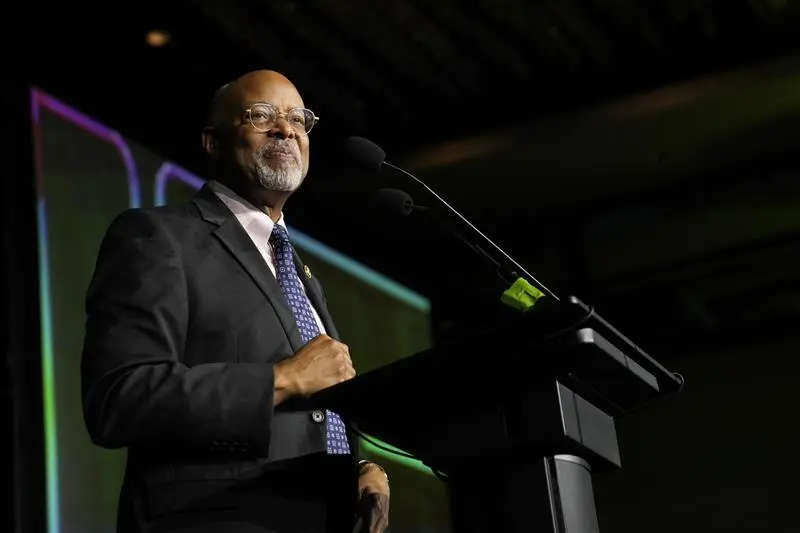What Now? Princeton Faculty React to Donald Trump Victory
Many ponder how dangerous a second term will be. ‘I think he needs to be taken seriously, but not literally,’ says Robert P. George
Editor’s note: This article has been updated to include additional responses.
The 2024 election produced a result much clearer than anticipated, and one that will likely have far-reaching implications for the United States. Donald Trump, twice-impeached and carrying convictions on 34 felony counts, nevertheless became only the second person in American history to win a second, nonconsecutive term as president. By sweeping through the battleground states, Trump also became the first Republican to win the popular vote since 2004. In congressional races, the GOP reclaimed the Senate, while the outcome for control of the House of Representatives remained unclear as of Friday afternoon.
“One important thing for despondent Democrats to remember, but ecstatic Republicans, too, is that politics doesn’t end. History doesn’t end,” Josh Marshall ’91, founder of Talking Points Memo told PAW. “Our natural tendency is to take the moment we are in and extrapolate it indefinitely into the future. But that’s almost never how things actually work. Many people are shocked and upset and disappointed by Trump’s return, but things can change very quickly, and often do. That often happens when people overinterpret the mandate that they have been given.”
Volumes will likely be written about the 2024 race, but in hopes of getting a wide range of initial takes, PAW spoke to faculty members across various disciplines to see how they interpret Trump’s victory and what they think the immediate future holds for the Democrats and the country.
Sean Wilentz, professor of American history
How much trouble are we in? A lot, and not because of Trump particularly, but because of people around him. This is very different from 2016, when he was a New York City kleptocrat who was amazed that he had won the election at all. The people around him now are seasoned, professional politicians and activists who have a very clear idea about what they want to do to the country. They are reactionaries. So, I not only fear for the New Deal, I fear for the entire reform tradition going back to the beginning of the last century — and then sometimes I fear for the Enlightenment! And I weep for Ukraine, which is on the brink of being destroyed by the Trump-Putin alliance — not to mention NATO. If the Democrats can hold on to the House, they’ll be able to check some of it. But there is a lot Trump can do by executive order without congressional approval that would be terribly damaging.
Barton Gellman ’82, visiting lecturer in the School of Public and International Affairs
I know people who are in the space of democracy and rule of law who are talking about moving overseas — not casually talking about it, but actually making concrete plans. My message is: Stay and fight. It’s our country too. Many voters were unhappy with the economy or feared that the country was changing beyond recognition, but I don’t believe they voted for a despot. I don’t believe that they want to see political opponents prosecuted. I don’t think they want to see our armed forces sent into cities to crush protests. I don’t think they wanted to see newspapers and TV networks being shut down.
As bad as the nightmare scenarios are, it may be hard for Trump to actually execute on them. The number of people who have deep knowledge of how the government works and how a particular department works and who are blindly loyal to Donald Trump, that’s got to be a limited universe. And so, you’re either going to have people who can’t find the light switches, or people who discover that they do have qualms about crossing red lines into something that’s plainly against the law or against the governing norms of a given federal department, and so I think there will be some resistance from within. I mean, honestly, every president laments the intractability of the bureaucracy, and Trump will be no different.
Sam Wang, professor of neuroscience, director of the Gerrymandering Project, and director of the Electoral Innovation Lab
There has been a movement against incumbent governments all over the world, and despite the relative strength of the American economy compared with other countries, the incumbent party, the Democrats, still suffered. I think a simple explanation is that that voters don’t pay attention to all the serious new things that came up during the campaign. They treated it like an ordinary election. And in an ordinary election, they swung against the incumbent party.
Think of things that didn’t matter. The Harris campaign was disciplined. It had a strong message. They had a ground game that appeared to be much stronger than both the Democratic party in past years and also the Republican party. Consider Trump’s statements themselves. He has more or less promised authoritarian rule, and the people working under him who wrote Project 2025 have made commitments that will fundamentally reshape the reach of federal power into people’s lives. Empirically, the evidence suggests that voters, to some extent, treated all of that as business as usual, and so they ignored the fairly serious, long-term consequences arising from this election.
On the other hand, nearly all of the House seats that are changing hands in this election will be in states that either had redistricting reforms through independent citizen commissions or were redrawn by a court to undo a gerrymander. I think that anti-gerrymandering efforts over the last few years have been extremely consequential in building competition. The playing field is much more level than it was 10 years ago.
If there is a reason for optimism today, I think it is that the federal system of American government makes it difficult to implement an authoritarian agenda. Furthermore, whichever party ends up controlling the House of Representatives will have a very narrow margin, which also creates the necessity for cross partisan action. Although I am very concerned about the tendency for federal courts not to restrain executive power, there are reasons to suppose that the American system has mechanisms for restraining authoritarian access.
Tali Mendelberg, professor of politics and co-director of the Center for the Study of Democratic Politics
Kamala Harris had a difficult task of jump-starting a campaign on short notice and distancing from an unpopular incumbent to which she was tied as vice president. She did not articulate a sufficiently convincing narrative of the economic struggles of core constituencies of the Democratic party and how her proposed policies would address those hardships. She did talk about her plans for an opportunity economy, but she did not develop those policy proposals into a coherent overall vision. A compelling economic message would have identified the source of the problem, acknowledged the economic struggles of ordinary people, and offered policies that followed directly from that vision. Instead, she focused on abortion rights, her experience as a prosecutor, and Trump. Biden’s late withdrawal left Harris an extremely narrow window in which to develop that message and hone her media interview skills.
Finally, because approval of the candidate as a leader does play a role in election outcomes, we do need to consider the role of Harris’ race and gender. There is little evidence that these make a large direct difference. However, given how close the popular vote was in the battleground states, there was likely some small but perhaps decisive effect of gender and race stereotypes that may have shaped perceptions that she lacked sufficient competence or would favor the interests of marginalized groups. Having run in 2020 as a California liberal probably fed those reservations.
Julian Zelizer, professor of history and public affairs
When someone is reelected, even with a break in between, who’s been very transparent about what he represents and what he supports, it becomes a legitimation of a certain version of politics. The MAGA Republican coalition has now received a strong signal of support.
What’s notable is not just the win, but its expanded reach. I think looking at the election as a historian, it feels like a very big moment.
I was also surprised by the dampened vote that Kamala Harris received in areas dominated by Democrats. For me, it’s just interesting to try and understand why the Democrats are slipping in these areas. For anyone who studies politics, Trump’s ability to so dramatically break with convention in terms of how he speaks and the things he was saying, and not suffer any political consequences under the electorate, is pretty stunning.
Robert P. George, professor of jurisprudence and director of the James Madison Program in American Ideals and Institutions
I was surprised that Trump won the popular vote, but I thought that he would win the electoral college. According to the vote totals we have seen so far, the only major demographic in which Trump’s percentage of the vote declined measurably from 2020 was with white voters. His percentage of the vote went up with every other major demographic. There was clearly dissatisfaction with the economy, especially with the cost of living and the price of ordinary groceries. That’s literally the kitchen table issue, and it is where Vice President Harris needed to find a way to distance herself from President Biden, and she couldn’t do that.
Voters were also concerned about Biden’s failures at the border. Whether she accepts the term “border czar” or not, the border was an area that was to be of special concern to her, and the fact that Latino voters on the border are swinging as dramatically as they have swung tells me that the unregulated border was a real problem in the public’s mind. It can’t be that Latinos hate other Latinos, but they are concerned about drugs, crime, human trafficking, gangs, and the failure to run orderly immigration system.
As for whether Trump ran a good campaign, well, he won, so who am I to judge? But it did honestly surprise me that some of his statements and some of his conduct did not hurt him worse than it did. I mean, I’m sure he had his campaign managers tearing their hair out at certain points. But you know, he won.
Also, I think we learned something very interesting about the Trump phenomenon. If we look back now over the past few years, since his defeat in 2020, which he still does not acknowledge, of course, it is this: Leave him on his own and he’ll hurt himself; attack him and his popularity goes up. This happened after the Mar-a-Lago raid, and then with first indictment, the second indictment, and the two assassination attempts. He does well in face of adversity, so I think the Democrats overplayed their hands, claiming he was a fascist and he’s Hitler. Of course, he called Kamala Harris a communist, too. They both played that game, but she paid a heavier price for the overheated rhetoric.
As for whether he has a mandate for everything he talked about during the campaign, I don’t think so. This is another moment to remind ourselves that Trump’s supporters take him seriously, but not literally. Trump’s fiercest critics take him literally, but not seriously. So, I do not expect literal mass deportations in his second term any more than I expected Mexico to pay for the border wall in his first term. I think he needs to be taken seriously, but not literally.
Frances Lee, professor of politics and public affairs
I’m very interested in the consequences of the election for governing. President-elect Trump made many bold promises that will be difficult to fulfill.
Tax policy will be coming up soon and because the Tax Cuts and Jobs Act of 2017 will expire, they’ll need to address that, so it will be on the agenda early. Trump has promised a lot of very large tax cuts, and so what will Republicans who have traditionally been concerned about fiscal balance do?
Of course, the voters are very concerned about inflation, so if you’re going to greatly expand the budget deficit, that has inflation risks associated with it. I’m going to be watching that and the ability of Republicans to coalesce. They have struggled previously. Even when most Republicans are willing to go along with the leadership, they need just about all of them, and there’s been holdouts or ranking members who make trouble for the leadership.
Douglas S. Massey *78, professor of sociology and public affairs emeritus
I was a bit surprised by the substantial shift in support by Latino voters towards Trump, but in retrospect, I shouldn’t have been. It is part of a broader reaction all over the world right now against globalization and what it’s done to countries through immigration and economic transformations.
I’m just finishing a book about the rise and fall of Venezuela as a petrostate, and you see the same thing happen there, with populists coming into power and absolutely destroying the country in 10 years, taking the most democratic and richest country in Latin America and turning it into a basket case. That’s what I’m afraid Trump is going to do to the United States, because he has no understanding of how the political economy works, and he’s very prejudiced and self-centered, and he shoots from the hip, and he doesn’t really understand the consequences of things he sets in motion.
Puerto Ricans are American citizens by birth, so they see immigrants as a threat, like other low-income Americans. What did surprise me was the extent to which Trump increased his support along the Rio Grande River in southern Texas. That’s because the flow of migrants has dramatically changed in recent years. It is no longer dominated by Mexicans. People coming across the border now are mainly from Central America, South America, or the Caribbean. And people of Mexican descent living along the southern border don’t see them as compadres.
I don’t think Trump will be able to deport 11 million people, but look at what Obama did in his first term. He ended up deporting more than 400,000 people a year, and he was able to do that through executive power. I think Trump will do the same thing, as well as some high-profile raids to get public attention. He’ll do a lot of damage to a lot of people. And the thing about the current status of the undocumented population is that it’s still dominated by Mexicans, but they are mostly people who have been in this country for 10 to 20 years and are now parents of American citizen kids. When you round up and deport undocumented adults, you’re really damaging the next generation of Americans.
Elizabeth Armstrong *93, associate professor of sociology and public affairs
We’re already seeing obstetric care being affected in states with [abortion] bans … [and] women not getting access to care that they would need. And there’s also people who have been documenting things like a potential increase in maternity-care deserts as obstetricians might choose not to practice in states with abortion bans.
So, we already see, just in what has happened in the two and a half years, almost since the Dobbs decision, we’re seeing that obstetric care has been affected dramatically. I think the question about fetal personhood is also a really interesting one, because that taps into a kind of longer-standing trend to move in the direction of thinking about the fetus as a person.
There’s a lot of concern on the part of women’s health advocates that those kinds of laws [regarding fetal personhood] will ultimately conflict with the question of whether a pregnant person has the right to terminate a pregnancy and to make that decision on her own.
Daniel Kurtzer, lecturer in SPIA and visiting professor of Middle East policy studies
We have the benefit of analytically understanding what Trump did in the first four years that he was president and most of it was maligned with respect to Israel and the peace process. He reversed course on much of what the United States had tried to do over the previous 30 years … . He basically cut relations with Palestinians.
He oversaw Secretary of State [Michael] Pompeo’s announcement that settlements were no longer inconsistent with international law. He supported Israel’s annexation and extension of sovereignty in the Golan Heights, and then he put forward a peace proposal … that was dead on arrival. Nobody except Israel found any utility in it. The only thing he did positive in that context was the so-called Abraham Accords which brought about normalization of the relations between Israel and four other countries — and that’s a good thing.
Already, [Israeli Prime Minister Benjamin] Netanyahu has announced his appointment of a settler to be his ambassador in Washington, someone who was born and raised in the United States and joined the Meir Kahane movement, the Jewish Defense League, and David Friedman, who was the U.S. ambassador to Israel in the first Trump administration, wants to go back for what he said in an article he wrote to “finish the job,” which, by that he described annexation of the [Palestinian] territories by Israel.
Interviews edited for length and clarity.












1 Response
Norman Ravitch *62
1 Year AgoNew Incarnation of Old American Traits
I am unimpressed with many of the reactions of Princeton faculty to Trump’s win in the election. Robert George and Julian Zelizer seem especially out of touch with things. Trump is only the latest version of old American traits: hatred of immigrants, hatred of cultural values, and hatred of the real meaning of independence and the Constitution.